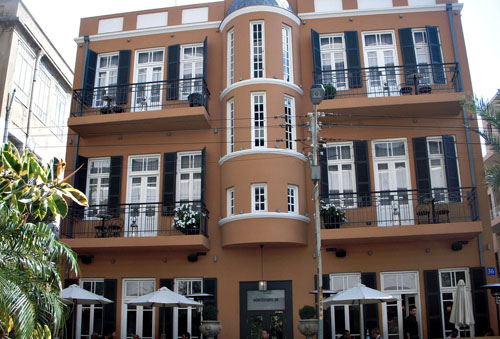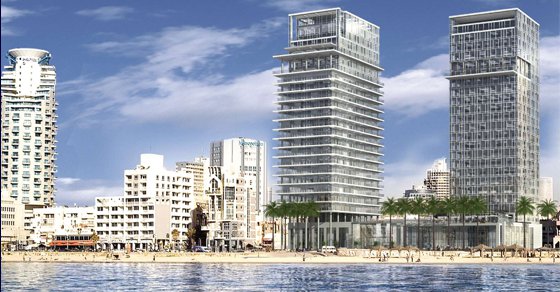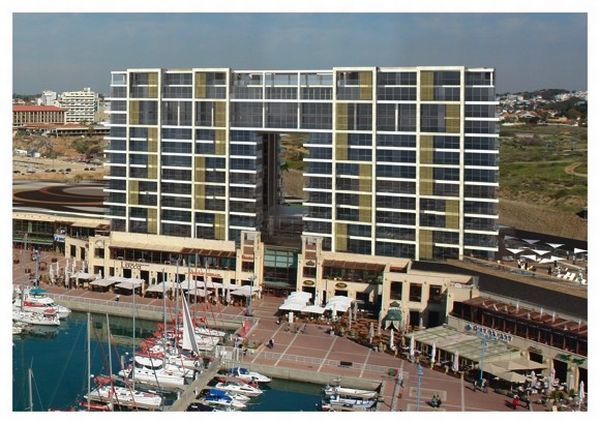The Luxury Hotel Sector is Growing in Tel Aviv
While Jerusalem has been long known for it’s luxury hotels like the King David, Inbal, David’s Citadel, the Mamilla, and the much anticipated Waldrof-Astoria, Tel Aviv has not known for it’s selection of luxury hotel and vacation accommodations. For the past two decades, the market has been dominated by the David Intercontinental, located on the southern shores of the city, close to the picturesque Neve Tzedek neighborhood.
Things are beginning to change, however. The boutique hotel sector has taken off over the past 10 years, with the city seeing the successful openings, most notably the Shalom Hotel and Hotel Montefiore. The two differ vastly from each other, with the Shalom catering to clientele of its beachfront neighbors like the Hilton, Sheraton, Renaissance, and Dan. The Hotel Montefiore on the other hand is located in Downtown Tel Aviv, or Lev Hair, in a historic building that underwent significant restoration, and is a hot spot for both tourists and Tel Avivians alike, with its lobby restaurant being amongst the city’s most popular eateries.
 The future is bright for the Tel Aviv hotel scene, for both the global brands and smaller boutique hoteliers. The world was taken notice of Tel Aviv, with this year seeing the upcoming opening of Israel’s first Ritz-Carlton hotel, located 15 minutes north of the Central Tel Aviv, on the Herzliya Marina, home to the country’s finest yachts and some of it’s finest private homes. Not only will it feature a world-class hotel, but will be host to private vacation residences, a popular form of property in the exclusive suburb. It’s been reported that over the next few years W, Kempinski, Waldrof-Astoria, and the Ritz-Carlton will be expanding into Tel Aviv as well. Additionally, a number of boutique hotels are under construction, with a great concentration in the Downtown district, hoping to emulate the success of the Hotel Montefiore.
The future is bright for the Tel Aviv hotel scene, for both the global brands and smaller boutique hoteliers. The world was taken notice of Tel Aviv, with this year seeing the upcoming opening of Israel’s first Ritz-Carlton hotel, located 15 minutes north of the Central Tel Aviv, on the Herzliya Marina, home to the country’s finest yachts and some of it’s finest private homes. Not only will it feature a world-class hotel, but will be host to private vacation residences, a popular form of property in the exclusive suburb. It’s been reported that over the next few years W, Kempinski, Waldrof-Astoria, and the Ritz-Carlton will be expanding into Tel Aviv as well. Additionally, a number of boutique hotels are under construction, with a great concentration in the Downtown district, hoping to emulate the success of the Hotel Montefiore.
Tel Aviv saw a record number of tourists last year, reaching close to 3.5 million, while it’s small borders only contain 58 hotels with 6,800 rooms. As a result, the short term apartment market has taken off, with investors bringing in an average of 6-7% on a well-maintaned and managed unit (while the city’s average is approximately 3%). There is good news for the hotel investor, however. Tel Aviv is flush with a number of suitable properties for luxury hotels, both large and small. The price tags for such properties isn’t what one might expect; in excess of 10,000 USD per square meter, but for the savvy investor, interesting and attractive deals do exist. With a great hole in the luxury hotel sector, it’s only an amount of time before Tel Aviv plays catch up.


